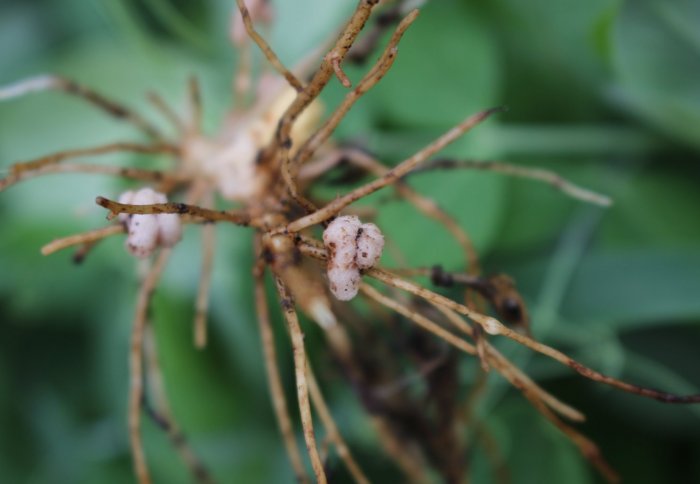New £4.5m project aims to use bacteria to supply nitrogen to plants

Nitrogen fixing root nodules with the bacteria Bradyrhizobium
Researchers are aiming to engineer bacteria to release extra nitrogen for crops, reducing reliance on artificial fertilisers, with a major new grant.
One of the problems in modern farming is to provide nitrogen at a level that is sustainable, that doesn’t harm the environment
– Professor Martin Buck
Department of Life Sciences, Imperial College London
Nitrogen is an essential nutrient for plant growth, development and reproduction. For many crop plants, it is currently applied artificially using chemical fertilisers. These take a lot of energy to produce and excess fertilisers in soils can run off into lakes and rivers, damaging local ecosystems.
Bacteria in the soil take nitrogen from the atmosphere and fix it into their cells, and an ambitious project is now trying to engineer bacteria so that they fix more nitrogen than they need, releasing this surplus nitrogen in the soil. The extra nitrogen could then be taken up into plants and used for their growth.
The project has been awarded a Strategic Longer and Larger grant of over £4.5 million from the Biotechnology and Biological Sciences Research Council.
Breeding altruism into bacteria
The lead investigator on the project, Professor Martin Buck from the Department of Life Sciences at Imperial, said: “One of the problems in modern farming is to provide nitrogen at a level that is sustainable, that doesn’t harm the environment. With chemical fertilisers there is so much nitrogen that some gets washed off and it can contaminate the water supply. A slow release into the soil using bacteria would be a good solution.”
We’re trying to breed altruism into these bacteria
– Professor Michael Stumpf
Department of Life Sciences, Imperial College London
“We’re trying to breed altruism into these bacteria,” added collaborator Professor Michael Stumpf, also from the Department of Life sciences at Imperial. “We want to trick them into making more nitrogen than they need, making this excess available to plants through the root system.”
In order to make bacteria do this, the team first need to understand how the bacteria monitor nitrogen levels in the environment and respond to the available supply by controlling their nitrogen metabolism. Professor Buck said that they already have a good idea of how bacteria behave, and now they need to work out how to get them to behave differently.
“One of the challenges is to make the bacteria think it’s low in nitrogen, because it should then switch on a system that takes on nitrogen gas and turns it into available nitrogen. When it carries out that reaction it has to then lose some of that nitrogen to the environment,” said Professor Buck.
Shortcut to symbiosis
Some plants have symbiotic relationships with bacteria that produce nitrogen, where the bacteria are embedded in the root systems, providing nitrogen directly to the plants. However, this is a complex relationship that is rare in food plants, and difficult to create artificially.
“What we’re proposing is to get crops like wheat serviced by these modified bacteria without them having to accommodate these bacteria in a very complicated symbiosis,” said Professor Buck. “It’s a long process to get to this stage, but it’s much quicker than creating a whole new symbiosis.”
Professor Buck hopes the technology will one day be easily and widely accessible. “One long-term idea is that when you take the plant seed to start the crop growing, you might coat it in these bacteria that would persist and support the plant growth.”
Major challenges
BBSRC’s Strategic Longer and Larger grants are designed to give world-leading research teams five years of funding and resources to address major challenges. The team led by Professor Buck and Professor Stumpf includes colleagues within Imperial, Professor Phil Poole at the University of Oxford and Professor Ray Dixon at the John Innes Centre.
Only three Strategic Longer and Larger grants were awarded this year, and Imperial researchers are also involved in one of the other winning projects. Professor Anne Dell and Dr Stuart Haslam from the Department of Life Sciences are working with the London School of Hygiene and Tropical Medicine to produce cheap and effective vaccines for poultry diseases.
Main image via Flickr user Foxy Tigre, licensed under CC BY 2.0
Article supporters
Article text (excluding photos or graphics) © Imperial College London.
Photos and graphics subject to third party copyright used with permission or © Imperial College London.
Reporter
Hayley Dunning
Communications Division